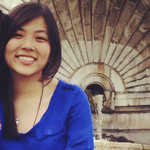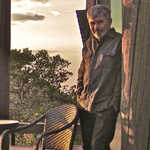Just the first name, I tell my friend at the Dia de los Muertos party, willing the preservation of some mystery. Guests in zombie face make-up and metallic capes refill their glasses near us as she decides how to introduce me to someone I should meet. Because it’s always who are you dating and not are you, as though this is an exercise regimen or dosage of vitamins, a placeholder preferable to an empty line on the dance card. Don’t tell me what he does or where you know him from, I caution. It will be nicer to discover details through four hours of opera, I think.
He texts eighteen times over the ten days before we have a drink across from the Met. To ask if I speak German, if I am dressing up, to address me by my last name. He is doing research. As I walk toward the long marble bar, the fishtail of my dark purple dress sweeping behind me, he stands in what I will learn is a bespoke black tux with a satin collar. We order champagne and talk about the act of leaving New York, his house upstate and beloved dog (the dog is always the phone screensaver), our friend in common and his interest in my culinary side projects. He answers his own question by guessing my age correctly, as slightly older men usually do - your research is excellent, I tease - and he mentions that he likes to cook breakfast. A gentleman should always know how to make a lady an omelette.
I hold his arm as we cross the street and present our tickets to ushers in wool capes. We begin to climb tiers of staircases, but are asked to pause for a series of photos. The opera company is keeping a public record of those in attendance youthful enough to buy season tickets for decades to come. In our seats, we adjust the translation screens that will display the libretto in English or Spanish. I turn mine off to focus on the mirrored stagecraft of Strauss characters who must find a shadow for the tortured Empress whose husband will otherwise turn to stone.
At the first intermission, we go down to see the magnificent chandeliers from where the orchestra plays, then for champagne and biscotti. Around us people are pensively unwrapping cellophane from nondescript sandwiches, racing the warning notes from xylophones calling us back to our seats. He puts his arm palm up on the armrest between us. This is a test, and I place my hand in his. Our fingers lock. His is a strong grip, and I see his eyes close for a moment as he takes a deep breath. It is the little things we miss between relationships too.
At the second intermission, we walk to the railing outside as everyone congregates before the final act. A tall older couple we pass stops us to ask if I’m famous, and explains that they saw us being photographed when we walked in. (I decide in this moment to be blonde for the rest of my life.) We laugh and tell them the opera has a new fashion site, and they look at each other with affection and wonder aloud why they weren’t pulled aside. His navy polyester blazer is easily twenty years old, as is the red ascot, and her crinkled silk scarf is over a slim pantsuit she is pulling off with their graceful couple language that transcends fabrics and trends. I imagine them reading scholarly articles and poetry to each other in their living room of mid-century modern furniture they wisely bought in the middle of the century, debating philosophy and egregious mayoral decisions as profiled in the paper of record. They ask us questions together, curious about his direction of television commercials in L.A. and in the domestic audience response to the type of journalism I do in my day job. They imagine us a couple, and as long as we four are standing here together under the chandeliers the fiction feels possible.
The final act is one of moral choices. The Empress who was once a gazelle decides she cannot take a mortal woman’s shadow, discarding advice from her wicked Nurse, and she is redeemed. Her husband is turned back from stone. The arias over, the raked stage recedes behind the curtain and the singers bow in front. The young conductor acknowledges his musicians with the house lights up. We wrap our scarves, and I gather the train of my dress in the hand not on his arm to descend the staircases. We walk toward the escalator down to his car and his dog waiting in his house upstate. “I will kiss you on the cheek unless otherwise instructed,” he says lightly, and I let him kiss my cheek. “This was so lovely,” I tell him and mean it. “You have ear muffs!” he notices. “Yes,” I say, turning. I am going back out into the cold.
Other moments in New York
-
Espressoing
in New York, United States -
A few more days
in New York, United States -
Goodbye
A final Hi meeting
in New York, United States -
meditation, Creativity
The local neighborhood bar has a quiet time between six and nine. It is a place that specializes in coffee, beer and seasonal menus. There is just enough of each for a satisfying snack and effective buzz. After the time when the laptop lids close and before the social gatherings start -- there is a sort of twilight*. Often this time is a fugitive ground rife with creative inspiration and meditative work -- of the kind that results in personal reward.*twilight may refer to civil, nautical or astronomical variety depending on your social or terrestrial condition
in New York, United States -
Web, development
A man positions his mouse on the edge of his browser window. He clicks, holds and drags the viewport first left then right. The content of a video game promo micro site responds and adapts to the available space. To the man, this is more delightful than the game itself.
in New York, United States -
subway, music
A man laboriously moves his piano down three levels onto the subway platform. Classic vocals and strided chords -- he played so well I swore he was blind. Oblivious to the heat on that August stage, he was most in touch with his audience -- whom he elevated with his music.
in New York, United States -
Feminism
A woman should do exactly as she pleases no matter what a man may think.
in New York, United States -
Travel
As the Dalai Lama once said, "It is a time when there is much in the window, but nothing in the room."
in New York, United States -
stars, Grandma, Love
"No one understands me," she said. Her grandmother was silent for a minute. It seemed she was searching for an answer in the star speckled sky. "But no one understands anyone in this world, darling. We are all unique. It is what gives us a sense of wonder."
in New York, United States

















